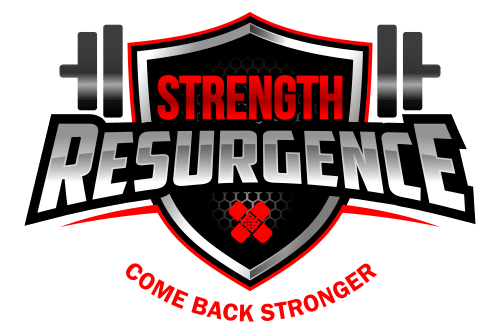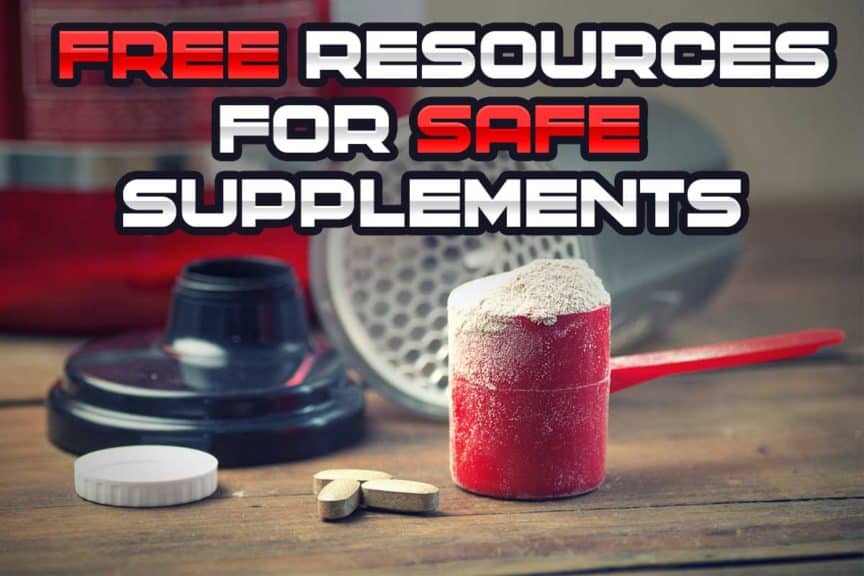Note: I have no affiliation with any of the following websites/companies. These are simply the most trustworthy and scientifically accurate websites out there for becoming informed on individual supplements and the companies selling various health and wellness supplements. I have used these sites for years regarding my own personal awareness and I continue to do so with great levels of confidence when looking to find the latest research findings on a particular supplement or rankings on product safety and efficacy.

If you’re serious about making the most informed decisions possible from the most trustworthy independent and/or watchdog companies for your supplementation, then you need to be using these three websites:
Keep scrolling and reading below for further discussion and insight to each of these organizations and why they should be:
Article contents:
Overview: The world of supplements
Who do you trust?
– The ups and downs of the internet for doing your own research
– When it comes to supplementation, everyone is an “expert”
– What about the food and drug administration (FDA)?
– Even more factors to consider…
– A quick side story to illustrate my point
Source 1: Examine.com
– What does examine.com actually do?
Source 2: Labdoor.com
A quick sidenote on the NSF logo
Source 3: Consumerlab.com
Concluding remarks
OVERVIEW: THE WORLD OF SUPPLEMENTS
“There is absolutely zero negative consequence to being a more informed human being.”
That’s a quote that I’ve kind of come up with and adopted over the past couple of years. Mostly because it is absolute truth, and I would encourage you to adopt it for yourself, especially when it comes to the world of nutritional supplementation. After all, the state of the industry isn’t really too far off from the wild, wild west; little regulation and everyone oftentimes has to fend for themselves.
So, get comfy, and dive on into this article as I break down how you can keep yourself as safe and informed as possible with your supplementation – all without spending a single dollar to do so.
THE UPS AND DOWNS OF THE INTERNET FOR DOING YOUR OWN RESEARCH
The internet is one of those things that can no doubt operate as a double-edged sword. On one hand, you have access to practically anything (knowledge, products, communication etc.) at your fingertips, which is downright amazing when you stop to think about it for a moment. But…
On the other hand, anyone can post this information and there can be so much of a given topic available by numerous individuals (many qualified, many not) that it becomes rather daunting, confusing and frustrating to try and figure out who is giving you the BEST (safest, most accurate, most detailed, etc.) as well as the most truthful information for a product that you’re interested in.
Furthermore, conflicting scientific information often abounds within the academic and research realms for topics within the realms of nutrition and supplementation.
And then when you factor in that a lot of people/companies aren’t always honest, are ignorant or just want to take your money, you can be left feeling rather uncertain on whether or not purchasing or using a product or supplement may be right for you or within your best interest.
Perhaps the epitome of this whole conundrum is found within the world of health food supplements and the respective products aimed at those looking to live active lifestyles and/or improve any aspect of their physical health and wellness.
Anyone who has pursued physical health and wellness for even just a relatively short length of time can likely identify with this issue: There is an absolute plethora of conflicting information out there pertaining to whether or not a certain health supplement or workout ergogenic aid (some form of work-enhancing product) is effective or safe (or both). As a result, it can be very difficult to determine if a particular supplement is thus worth the purchase.
WHEN IT COMES TO SUPPLEMENTATION, EVERYONE IS AN “EXPERT”
Furthermore, everyone and their grandma claims to be an expert on nutritional supplementation. This certainly doesn’t help resolve the problem of knowing if purchasing and consuming a supplement is in your best interest or not. One “guru” might tell you one thing while another “guru” tells you completely contradictory info.
In reality, the best people out there are the ones who openly proclaim that there is a lot to be considered on numerous levels and that dealing “in absolutes” is rare when discussing supplementation. It’s even tricky for the experts to keep things straight or stay up to speed on the topic of nutritional or performance supplementation. Even the academic research that is being churned out at high rates often produces conflicting information from one study to another.
When wanting to make informed choices with dietary supplementation, it’s important to have trustworthy resources that you can go to in order to ensure that you’re not wasting your hard-earned money on ineffective, unproven supplements, but it’s even more important to make sure that what you’re consuming is safe. Having independent resources in your arsenal is crucial for this.
WHAT ABOUT THE FOOD AND DRUG ADMINISTRATION (FDA)?
The Food and Drug Administration (FDA) does not regulate the supplement industry, so this should instantly put consumers on higher alert when looking to add supplementation to their diet and/or training regime. As long as a supplement company puts that old “These statements have not been evaluated by the Food and Drug Administration…” label on their product, they can essentially say whatever they want.
Though the FDA will step in when a supplement receives enough consumer complaints/reports, this is only an after-the-fact occurrence. Furthermore, it’s not exactly confidence inspiring when you learn that it has been found that these contaminated supplements or their formulas can remain or re-appear on store shelves even after FDA intervention.1,2
EVEN MORE FACTORS TO CONSIDER…
And then of course there is the variability in supplement efficacy and safety that can come from different companies and brands. A scientifically researched and proven supplement (such as a plant extract or amino acid compound) can have far less than ideal efficacy depending on how an individual company produces and manufactures their product, and/or combines it with another substance, etc.
This could be as simple as using an inferior type of that supplement or including it in very diluted/minimal amounts that are far below a clinically effective dose. It could also include a situation such as utilizing an ineffective ratio of the compound to other substances.
This is not an exclusive list, but just serves to illustrate the fact that efficacy and even safety can wander into a seemingly grey area rather quickly.
EXTRA CAUTION REQUIRED FOR ATHLETES

Athlete’s have an extra level of concern to factor in as many supplements can have trace amounts of banned substances within their product.
It’s not an unheard of event within the world of collegiate sports and professional athletics for athletes to inadvertently test positive for a banned substance that was in an over the counter supplement that they purchased such as a protein powder or workout supplement. It’s estimated that 6.4% to 8.8% of doping cases (testing positive for a banned substance) for athletes are due to tainted dietary supplements.3
WHO DO YOU TRUST?
If you have someone in your network that you can truly trust with health supplement information, then of course you can use their knowledge as well. This is a very individual factor for the consumer (you) and it ultimately comes down to your trust in them.
And while it’s not a bad thing to ask others on a particular supplement or product, I would encourage everyone to always consider the source and still use the following websites as the backbone of your decision making.
If you happen to know an individual who practices professionally in the fields of nutrition, medicine, pharmacy, etc, then you’ll most likely find confidence with them. But, if your most knowledgeable personal source within your immediate sphere is some random guy you just met at the gym last week, then you might want to take what they say with a grain of salt (or just not heed their advice).
CONSIDER THE SOURCE
As with anything else in the world of being an informed consumer, you must always take into account the source. Many health food stores have sales employees whom while are seemingly well-versed on the products and supplements they sell are oftentimes rather misinformed themselves or only have superficial knowledge of what they’re selling.
Factor in that many of them may be working on a commission basis and you may get taken for a ride. Best case scenario here is that you just lose your money. Worst case scenario (and typically rare, thankfully) is you adversely affect your health along the way.
Now, I am NOT saying that this is the case with every health food/supplement salesperson, so please don’t think that’s what I’m saying; many are incredibly well-versed, honest and do have your best interests.
I’ve come across plenty of them. Rather, I’m saying the problem is that if you don’t have an established rapport with them or don’t know their background, you might not know if you can take them at their word or not with the information they give you as you stand there in the store.
They could be an incredibly well-informed and trustworthy source…or they could just be a smooth-talking salesman. You just don’t know.
A QUICK SIDE-STORY TO ILLUSTRATE MY POINT:
I remember one time I was casually browsing a supplement store and the gentleman asked if I required assistance. I didn’t, but since I was standing in front of their company’s multivitamins, I got a big presentation on how every ingredient in their multivitamin was superior to other multivitamin brands. Yet, the magnesium within the multivitamin was in the form of magnesium oxide, which has by far the lowest bioavailability of all forms of supplemental magnesium (it’s also the cheapest to produce).4–6
So since I knew this, of course just for the fun of it, I then asked why they would use an inferior form of magnesium in a “superior” product. I wasn’t trying to be a jerk, but if you’re gonna sell me on something, you’d better know everything about your product, including why a “superior” multivitamin uses the most inferior magnesium compound of them all.
Now, of course that doesn’t make the WHOLE multivitamin worthless, but I’m just using this as a real-world example of why I believe it’s important to be as informed as possible in regards to supplements.
So, with that little side-story out of the way, here are the top three websites I recommend to ensure you are getting scientifically accurate information or product safety or both.
SOURCE 1: EXAMINE.COM
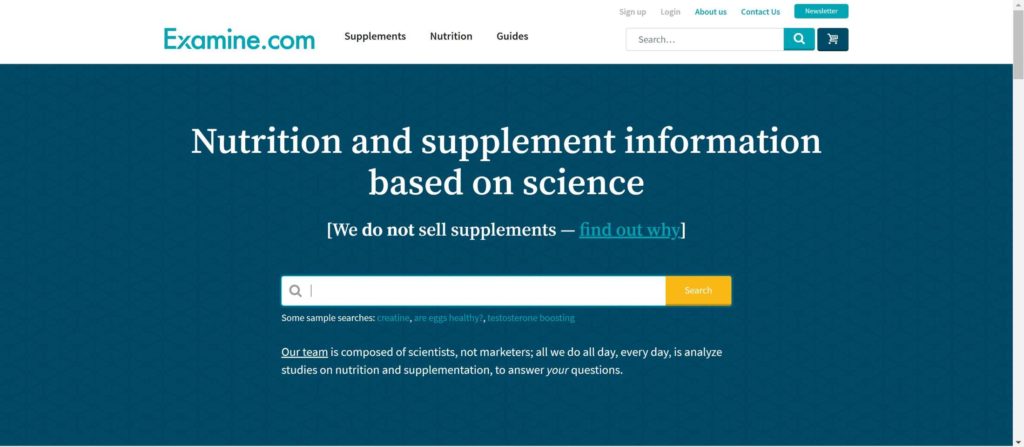
Examine.com is an authoritative figure on the scientific gathering of research for supplementation as well as interpretation of current scientific understanding of particular nutritional and supplemental substances.
This site has been a go-to for me for some years now whenever I’m looking at quickly identifying the research and findings of a particular supplement. Furthermore, whenever I’ve had clients or patients looking to learn a bit more about effective supplementation in conjunction with their newly active lifestyle, I frequently refer them to examine.com.
They do all the work in terms of finding, gathering and compiling all the findings and information pertaining to nutritional substances and supplements, and it’s always presented in a straight-forward, detailed and scientifically accurate manner.
They provide breakdowns of overall effectiveness (or ineffectiveness) and the ideal dosing methods if an individual chooses to take a particular supplement.
If you have any interest in learning more about supplements, you might as well bookmark this page since you’ll likely be going back to it again and again, just like me.
WHAT DOES EXAMINE.COM ACTUALLY DO?
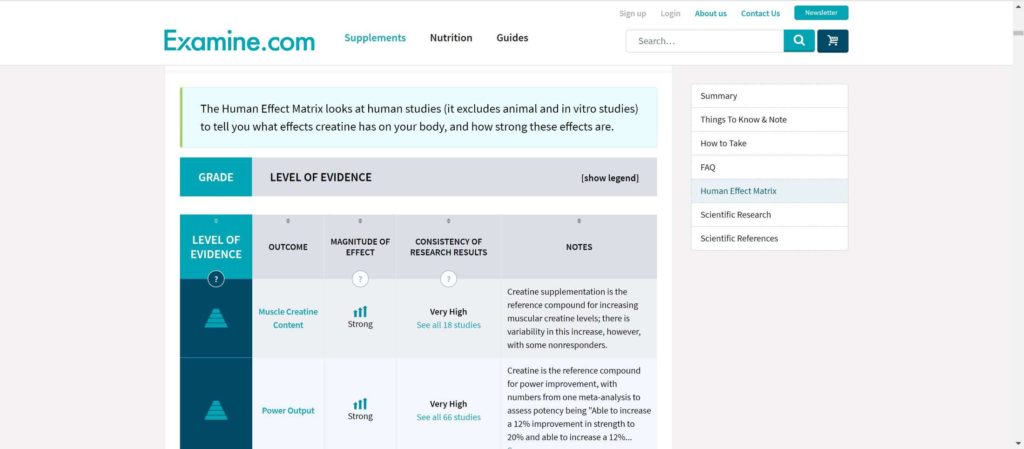
Examine.com is an incredibly large database – the largest, in fact – for supplement and nutrition research.7 They came around in 2011 with a mission of analyzing all the available evidence that is available to help individuals make healthier and more informed choices.
They are an educational organization and therefore they do not hold any affiliations with supplement or food companies. In addition to this, members of their research team are not permitted to hold any affiliations, either.7
For any of the summaries that they present, each one will be fully referenced. They have it all, from the most popular and most studied supplements such as creatine and fish oil supplements and much more. They also have a lot of information and resources on nutritional topics.
Another thing that makes Examine.com so great is their belief and implementation in using a very evidence-based approach when answering common questions that the general public asks. Again, they cover these frequently asked questions for supplements and nutrition and always give their answers based on what the current body of evidence is showing for that particular topic.
You can rest easy with these guys since they will never tell you what to do. Their job is to merely state what the current evidence is saying, be it abundantly clear, controversial or lacking.
Knowing all these approaches that they take really puts any reader at ease. You’re not being pressured in any sort of way with these guys for buying anything, and you will get a strong sense that they are never taking sides. It’s just all laid out and presented in a way that lets you make your own decisions.
Just in case you’re still not entirely sold on using examine.com, it may help to know that they do not allow donors, sponsors, consulting clients, advertisements or affiliations on their site or within their organization. They even state that they have a “very strict” no gift policy for any of their staff members from any outside companies or organizations.7
So, what does this all mean? It means that you have an extremely evidence-based, thorough, non-biased and trustworthy website to help you feel more informed on nearly all forms of supplements and popular nutritional topics.
SOURCE 2: LABDOOR.COM
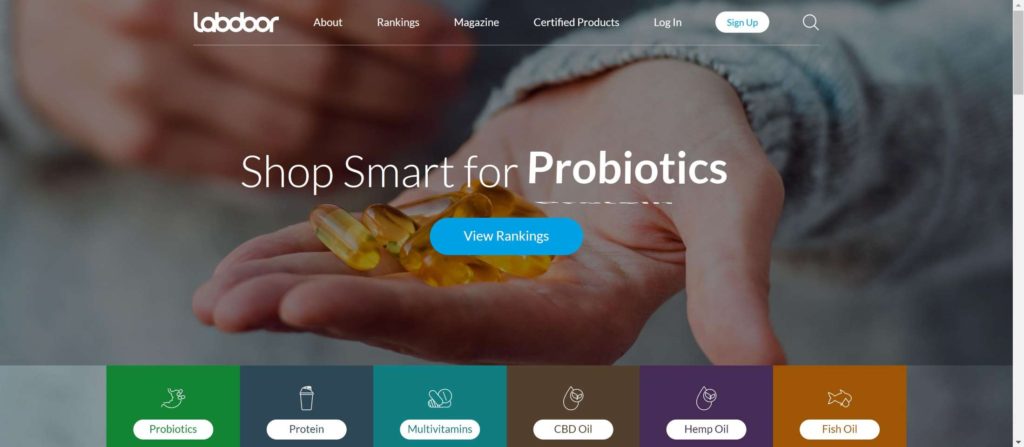
Labdoor is a company organization that I have used for a few years now in addition to examine.com. They are an independent watchdog company that pulls popular supplements from popular brands off store shelves to run independent testing on product label accuracy, product safety and overall value. They routinely test supplements ranging from protein powers to vitamins, minerals, ergogenic aids, fish oils and much more more.
All of their testing is done at a FDA (food and drug administration) laboratory for thorough and detailed chemical analysis, allowing them to test for active ingredients as well as presence and amount of contaminants within products.8
Once their test results for a product are complete, they assign their rank and grade based on the test results in comparison to the product’s label claims. This includes overall label accuracy, product purity, nutritional value, projected efficacy of the product among others.8
What’s especially great is that from there they provide a categorical ranking from best to least ideal, allowing for easy and quick visual understanding of where the product of a particular brand ranks compared to other brands.
So, if you’re simply looking for the quick rundown as to where one brand ranks in comparison to another, you’ll have what you need on a single page. Then, if you want further information, you can click on that individual brand within the list and be taken to a new page that displays more in-depth information as to how the product tested.
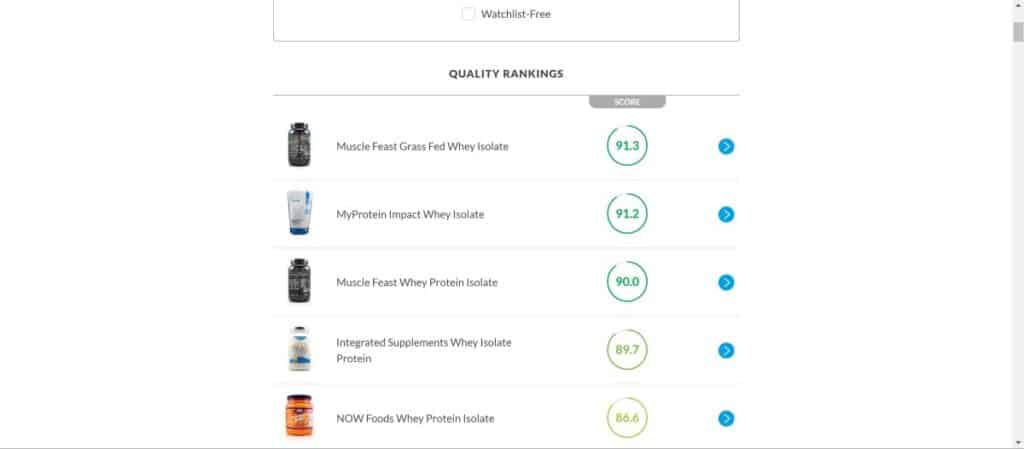
After they do all of their grading and ranking, they write their reports and publish their findings for free so as to help consumers confidently buy the best supplementation for their health.
For me personally, it has been interesting to see over the past years which companies seem to routinely test poor for label accuracy and/or overall safety for either one particular supplement or their line of supplements. I’ve seen other companies and their respective products routinely test rather well.
When you see these themes play out on a regular basis, you start to have an understanding of which brands you might want to stop considering all together.
Many of the supplement brands that they test are the mainstream, common brands that you routinely find at supplement stores such as GNC. This makes the site all the more impactful since the companies being analyzed by labdoor.com are the big boys in the supplement industry that have the largest reach across the population.
Athletes should especially consider looking at brand findings on labdoor.com as they test for banned substances and provide an approval icon if the supplement passes purity standards. This goes a long way in peace of mind if you’re someone who could be routinely drug tested within your sport.
A QUICK SIDENOTE: THE NSF LOGO
Here’s a little bit of bonus material:
As an added measure of peace of mind when purchasing supplements, whether you’re an athlete or just a health-conscious consumer, NSF international is a public health and safety organization that independently tests various products (not just limited to food and supplements) within the global markets.
Their mission is to protect global human health, and they do so as an independent, accredited organization serving the public.9
Sidenote: If you are wanting to ensure that a supplement you’re looking at purchasing is certified to be banned-stimulant free, you can look for the blue “NSF” logo or the “NSF – Certified for Sport®” logo on the supplement container, which is a certification of the Public Health & Safety Organization, stating that the product does not contain substances that are considered to be banned by the majority of major athletic organizations.10,11
SOURCE 3: CONSUMERLAB.COM
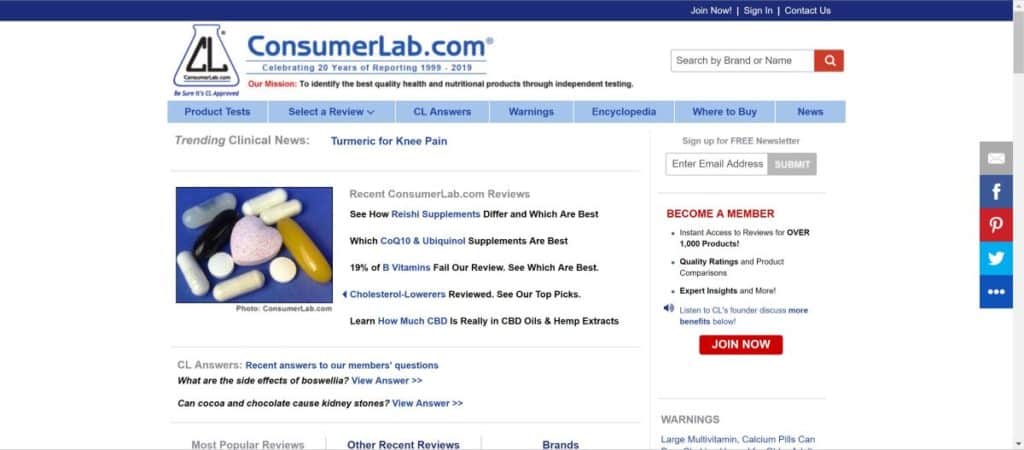
The third site to keep in your “trusted source” arsenal is Consumerlab.com. Much like Examine.com and Labdoor.com, they are an independent source for testing and providing information on a variety of health supplements, foods, medications and much more.
Products that have successfully passed their analysis are then included on their list of Approved Quality products as well as bear their CL Seal.12 To date, they have tested more than 5,600 products across 850 different brands for supplements of adults, children and even pets.12
The site itself doesn’t just stop with their lab testing and product reviews; they also have an encyclopedia that covers herbs & supplements, conditions, drug interactions and alternative therapies.
Click here to be taken to their site, where you can read their overview of who they are and what they’re all about.
When it comes to their independent testing of products, they really cover an extensive list. They cover health and nutrition products (herbal products, vitamins, minerals and other supplements), prescription medications, sports supplements, functional foods, foods and beverages and even personal care products.12
Though their site layout isn’t quite as aesthetically pleasing or as modern appearing as the two aforementioned websites, they are still an invaluable resource for all things supplementation along with health and wellness. It takes a bit more time to figure out how to navigate around their website, but it’s relatively minimal and well worth it.
Since there is such a world of information to explore on their website, it’s worth also bookmarking their page if you are inclined to read up on multiple supplements and/or products.
CONCLUDING REMARKS
There is a world of information on consumerlab.com, and when you combine it with information from Examine.com and Labdoor.com, you can arrive at an informed and thus confident decision as to whether or not a supplement or product is an ideal choice for you. Don’t expect to necessarily learn all the information on a particular supplement or product within a single day. It can take time, but anything worth learning typically does.
Your overall health and wellness is a pretty big deal, so it only makes sense to inform yourself as much as possible through the most trusted and extensive resources available when wanting to be sure that the supplements and products that you’re taking in attempts to improve or maintain your overall health are in fact going to do just that.
WORKS CITED:
1. Cohen PA, Maller G, DeSouza R, Neal-Kababick J. Presence of banned drugs in dietary supplements following FDA recalls. JAMA. 2014;312(16):1691–1693.
2. Tucker J, Fischer T, Upjohn L, Mazzera D, Kumar M. Unapproved pharmaceutical ingredients included in dietary supplements associated with US Food and Drug Administration warnings. JAMA Netw Open. 2018;1(6):e183337–e183337.
3. Mathews NM. Prohibited contaminants in dietary supplements. Sports Health. 2018;10(1):19–30.
5. Rylander R. Bioavailability of magnesium salts–a review. J Pharm Nutr Sci. 2014;4:57–9.
7. About. Examine.com. https://examine.com/about/. Accessed May 26, 2019.
8. About us. Labdoor. https://labdoor.com/about. Accessed May 26, 2019.
10. The NSF Mark – NSF International. http://www.nsf.org/about-nsf/nsf-mark. Accessed May 26, 2019.

Hi! I’m Jim Wittstrom, PT, DPT, CSCS, Pn1.
I am a physical therapist who is passionate about all things pertaining to strength & conditioning, human movement, injury prevention and rehabilitation. I created StrengthResurgence.com in order to help others become stronger and healthier. I also love helping aspiring students and therapists fulfill their dreams of becoming successful in school and within their clinical PT practice. Thanks for checking out my site!
